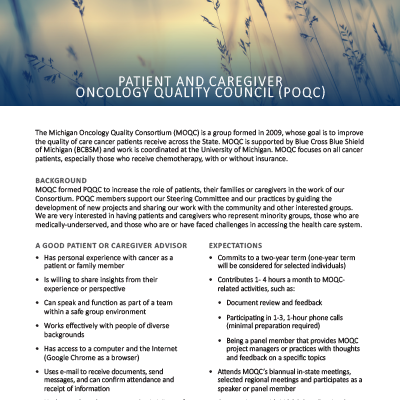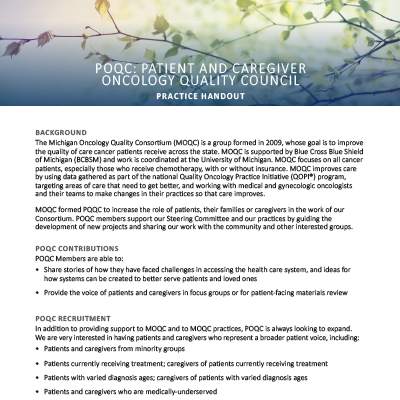The Michigan Oncology Quality Consortium (MOQC) is a group formed in 2009, whose goal is to improve the quality of care cancer patients receive across the state. MOQC is supported by Blue Cross Blue Shield of Michigan (BCBSM) and work is coordinated at the University of Michigan. MOQC focuses on all cancer patients, especially those who receive chemotherapy, with or without insurance.
Patient and Caregiver Oncology Quality Council (POQC) Contributions
POQC Members are able to:
- Provide the voice of patients and caregivers in focus groups or for patient-facing materials review
- Share stories of how they have faced challenges in accessing the health care system, and ideas for how systems can be created to better serve patients and loved ones
POQC Workgroups
Patient and Caregiver Resources:
Patient and Caregiver Resources Workgroup Cancer affects not only people who are diagnosed but also their families, caregivers and friends. Getting a cancer diagnosis can be overwhelming, and the Patient and Caregiver Resources Workgroup is working to make things a little easier for everyone on this difficult journey. The goal of this workgroup is to find, evaluate and provide useful information, so it’s easy for those impacted by cancer to find help, support, and guidance.
Types of resources the Patient and Caregiver Resources Workgroup is working on includes:
- Support for patients and caregivers
- Financial and legal issues
- Transportation
- Food and nutrition
- Advance Care Directives
- Palliative and end of life care
- …and more!
Check out the Resources Search Engine to find meaningful resources available to you.
Financial Navigation:
Finances play a huge role in any health condition, but especially cancer. There are many legal and logistical issues that can be very confusing, all on top of going through a cancer diagnosis. The goal of this group is to put together helpful resources that can guide patients through the financial aspects of cancer.
Recruitment and Retention:
This workgroup focuses on the expansion and retention of POQC, paying particular attention to addressing the substantial gaps in healthcare experiences faced by historically marginalized people. The target of current recruitment efforts is recruiting people who have minoritized population status in and of the following categories: race/ethnicity, LGBTQIA+, disability status, and armed services experience.
Members of MOQC and POQC will reach out to patients or caregivers of interest and schedule one on one meetings to discuss participation.
For more information, please contact Vanessa Aron.


